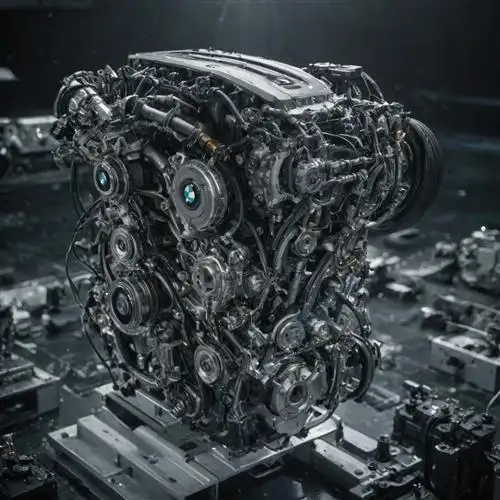
Keep Your Fluids Topped Up
Maintaining your BMW X3 is crucial to ensure its optimal performance and longevity. One of the most critical aspects of this maintenance is keeping your fluids topped up. The fluids in your X3 play a vital role in lubricating and protecting the various components of your vehicle, and neglecting them can lead to costly repairs down the line.
Starting with the engine oil, it's essential to use the recommended grade and quantity specified by BMW. Regularly checking the oil level and topping it up as needed is crucial. Neglecting this can lead to increased friction and wear on the engine, ultimately reducing its lifespan. Additionally, be sure to change the oil and filter at the recommended intervals to ensure the engine is running at its best.
The transmission fluid is another vital fluid that requires attention. Automatic transmissions in the BMW X3 need regular fluid changes to ensure smooth shifting and prevent internal component wear. Consult your owner's manual or a BMW-certified technician to determine the appropriate fluid type and change interval for your specific model.
Braking is a critical safety system, and the brake fluid plays a crucial role in ensuring your brakes function properly. Over time, the brake fluid can absorb moisture, which can compromise the performance of the braking system. Regularly flushing and replacing the brake fluid is essential to maintain the integrity of your braking system.
The cooling system is another area that requires vigilance. The coolant in your BMW X3 helps regulate the engine temperature, preventing overheating and potential engine damage. Be sure to check the coolant level and top it up as needed, and replace the coolant at the recommended intervals to ensure the system is functioning efficiently.
Finally, don't forget about the power steering fluid. This fluid lubricates the power steering system, making it easier to turn the steering wheel. Neglecting the power steering fluid can lead to increased effort when steering and potentially cause damage to the power steering components.
Brake Maintenance Matters
Maintaining the brakes of your BMW X3 is a critical aspect of ensuring its optimal performance and your safety on the road. Neglecting brake maintenance can lead to costly repairs and potentially dangerous situations. As experts in the field, we've compiled several valuable tips to help you keep your BMW X3's brakes in top condition.
Regular brake inspection is essential. It's recommended to have your brake pads, rotors, and calipers checked by a professional at least once a year or every 12,000 miles, whichever comes first. This allows for the timely identification of any issues and the opportunity to address them before they escalate.
Monitoring brake pad thickness is crucial. Worn-down brake pads can compromise your braking power and increase the risk of brake failure. Keep an eye on the pad thickness and replace them as soon as they reach the minimum recommended thickness, typically around 4-5 millimeters.
Regularly cleaning your brake components can also extend their lifespan. Use a brake-safe cleaning solution to remove any buildup of dirt, debris, or brake dust, which can cause premature wear and tear. This simple maintenance task can help prevent the need for more extensive brake repairs down the line.
Proper brake fluid maintenance is another essential aspect of keeping your BMW X3's brakes in top shape. The fluid should be flushed and replaced according to the manufacturer's recommended schedule, typically every 2-3 years or 30,000 miles. Old or contaminated brake fluid can negatively impact the hydraulic system and reduce braking efficiency.
As you navigate the roads, it's also important to be mindful of your driving habits. Avoid aggressive braking, which can lead to increased wear and tear on your brake components. Instead, practice smooth and gradual braking to extend the life of your brakes. For more tips on maintaining your BMW X3's comfort, check out our article on Avoid Discomfort in the BMW X3 with These Tips.
Tyre Rotation and Replacement
6 Secrets of the Experts for Maintaining Your BMW X3
Tyre Rotation and Replacement
Regularly rotating your BMW X3's tyres is crucial for ensuring even wear and maximising their lifespan. This simple yet effective maintenance practice can help you avoid uneven tread wear, which can compromise handling, stability, and safety. Ideally, you should rotate your tyres every 5,000 to 7,500 miles, or as recommended by your owner's manual. This involves moving the front tyres to the rear and the rear tyres to the front, alternating between the sides.When it comes to tyre replacement, it's essential to use high-quality tyres designed specifically for the BMW X3. These tyres are engineered to provide the optimal balance of performance, comfort, and safety. While the original equipment (OE) tyres may be a good starting point, you may also consider upgrading to a set of premium aftermarket tyres that offer improved handling, reduced road noise, and better fuel efficiency.When selecting replacement tyres, be mindful of the tyre size, speed rating, and load index specified for your BMW X3. Using the wrong tyre size or type can have adverse effects on the vehicle's handling, braking, and overall performance. It's always a good idea to consult with a reputable tyre specialist or your BMW dealer to ensure you're choosing the right tyres for your vehicle.Additionally, it's crucial to monitor your tyres' tread depth regularly. The legal minimum tread depth in many regions is 1.6 millimetres, but for optimal safety and performance, it's generally recommended to replace your tyres when the tread depth reaches 3 to 4 millimetres. Investing in a reliable tread depth gauge can help you stay on top of this important maintenance task.Remember, properly maintained and replaced tyres can significantly contribute to your BMW X3's overall performance, fuel efficiency, and safety. By following the expert tips outlined here, you can ensure your vehicle continues to deliver the exceptional driving experience that BMW is known for.Battery Care and Replacement
The BMW X3's battery is the heart of its electrical system, powering everything from the lights to the infotainment system. Proper care and timely replacement are essential to ensure your X3 runs smoothly and reliably. Experts recommend regularly checking the battery's charge level and condition to avoid unexpected breakdowns. One common issue is battery drain, often caused by leaving lights or accessories on. To prevent this, make a habit of double-checking that all electrical components are turned off before exiting the vehicle.
When it comes time to replace the battery, it's crucial to use a high-quality, compatible replacement. Inferior batteries can cause a range of problems, from poor starting performance to electrical system malfunctions. BMW-approved batteries are designed to meet the specific requirements of your X3, ensuring seamless integration and reliable performance. During the replacement process, be sure to follow the manufacturer's instructions carefully to avoid any issues.
Regular battery maintenance can also extend its lifespan. This includes cleaning the battery terminals to prevent corrosion and ensuring the battery is securely mounted. Some experts recommend using a battery maintainer or trickle charger during extended periods of inactivity, such as when the vehicle is in storage. This can help prevent the battery from becoming fully discharged and preserve its overall health.
Keeping the Engine in Peak Condition
Maintaining the engine of your BMW X3 is crucial for ensuring its longevity and optimal performance. The experts have several secrets to share that can help you keep your X3's engine running at its best. From regular oil changes to monitoring coolant levels, these tips will help you stay ahead of any potential issues and extend the life of your vehicle's most essential component.
Regular Oil Changes: The lifeblood of your engine, oil plays a vital role in lubrication and heat dissipation. Experts recommend changing your X3's oil and filter at the manufacturer's recommended intervals, using only high-quality synthetic oil. This not only keeps your engine well-lubricated but also helps reduce wear and tear on critical components.
Coolant System Maintenance: The coolant system in your BMW X3 is responsible for regulating the engine's temperature, preventing overheating and potential damage. Regularly checking the coolant level and ensuring the system is free of leaks is essential. Additionally, flushing the coolant system and replacing the coolant at the recommended intervals can help maintain optimal cooling efficiency.
Air Filter Replacement: The air filter in your X3 plays a crucial role in ensuring your engine receives clean, unobstructed airflow. Over time, the filter can become clogged with dirt and debris, reducing engine performance and fuel efficiency. Replacing the air filter as recommended by the manufacturer can improve engine responsiveness and overall efficiency.
Spark Plug Maintenance: Spark plugs are responsible for igniting the fuel-air mixture in your X3's engine, and their condition can significantly impact engine performance. Replacing spark plugs at the recommended intervals, as specified in your owner's manual, can help ensure your engine is operating at peak efficiency.
Fuel System Cleaning: Carbon buildup and deposits in the fuel system can hinder engine performance and reduce fuel economy. Experts recommend using a fuel system cleaner at regular intervals to help dissolve these deposits and keep your X3's engine running smoothly.
Maintaining the Exterior and Interior
Preserving the pristine condition of your BMW X3's exterior and interior is crucial to maintaining its value and ensuring it continues to provide an exceptional driving experience. From regular washes to meticulous detailing, here are the secrets the experts use to keep their BMW X3s looking their best.
- Wash your BMW X3 regularly using a high-quality car wash soap. Avoid using household cleaners, as they can damage the paint and clear coat.
- Use a microfiber mitt or wash pad to gently clean the surface, working from top to bottom to prevent water spots.
- Dry the vehicle with a high-quality microfiber drying towel, wiping in straight lines to prevent water spots.
- Apply a premium car wax or sealant every few months to protect the paint and enhance its shine.
- Clean the wheels and wheel wells using a dedicated wheel cleaner, and don't forget to rinse away any residue.
- Inspect the exterior for any chips, scratches, or other damage, and address them promptly to prevent rust and further deterioration.
- Vacuum the interior regularly, paying close attention to the carpets, floor mats, and crevices.
- Use a soft-bristle brush or upholstery cleaner to gently clean the seats, door panels, and other interior surfaces.
- Condition the leather seats and steering wheel with a quality leather conditioner to keep them supple and prevent cracking.
- Clean the interior glass surfaces, including the windshield, windows, and mirrors, using a premium glass cleaner.
- Avoid using harsh chemicals or abrasive cleaners, as they can damage the delicate interior materials.
- Regularly check for any signs of wear or damage, such as torn or worn upholstery, and address them promptly.

















